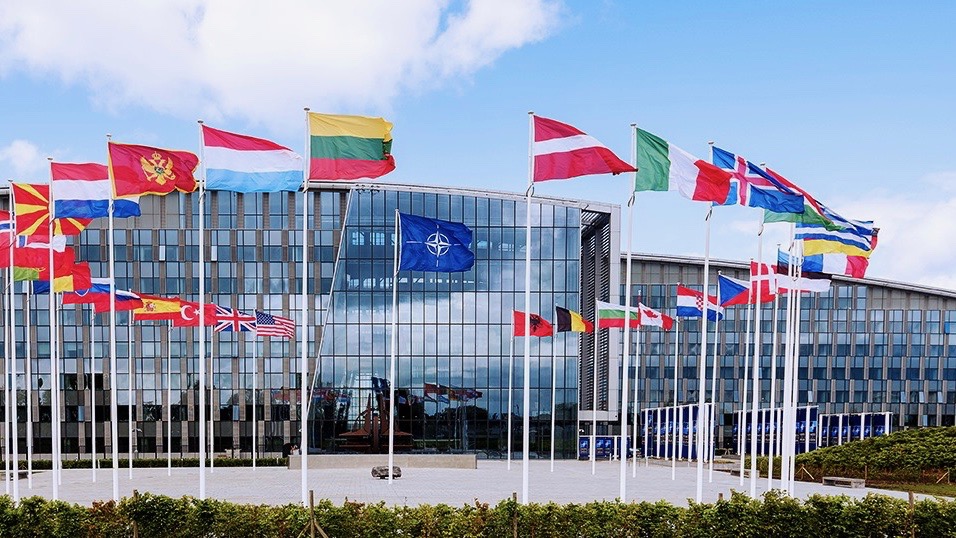One of Europe's most scenic railways winds it way across Swedish Lapland, through the Nordic nation's highest mountains and into Norway where it straddles a spectacular fjord on its way to the port city of Narvik.
While it is now both a 21st century niche tourist attraction and important economic link the railway played a crucial and relatively unknown role in the 20th century war waged by Adolph Hitler. And that story is highly relevant today as Sweden considers whether to drop its long-held "neutrality'' status and join the world's largest military defense alliance otherwise known at NATO.
Recently Swedish Prime Minister Magdalena Andersson, commenting on mounting pressure to join NATO in the face of the brutal onslaught against Ukraine and the overall security threat Vladimir Putin poses to Europe, remained skeptical as she insisted neutrality has "served Sweden's interests well.''
If Andersson was referring to the "moral superpower'' status that the Swedish Social Democrat government helped forge through the tumultuous post-World War II Cold War years, especially in the 60s and 70s, she is probably correct. Neutrality made it easier for Sweden to take the high road in championing causes such as anti-apartheid in South Africa, Palestinian nationhood and anti-fascism in Chile.
Another brave, independent post war path, of course, was Sweden's lone European role providing a safe haven to American men that refused to fight in the Vietnam War. From across the Atlantic Ocean that beacon of progressive, "neutral'' social democratic light certainly attracted my attention in the early 1970s as I contemplated the possibility of having to fight in the unjust, illegal Southeast Asian war.
A decade and a half later I had the chance to witness up close the Swedish reality. During a six-year stint as a foreign correspondent based in Stockholm and covering the four-nation Nordic region the Swedish shine began to fade – and that was not only because of long, dark winter days. A year or so after relocating to Sweden I began to understand there was more disdain than bonhomie when it came to the attitude Danish, Norwegian and Finnish citizens had towards their Swedish neighbours.
Covering an international hockey tournament in Helsinki provided an initial glimpse of this resentment. Every time the Swedish hockey team took the ice during the two-week event, Finnish spectators became boisterous supporters of their neighbour's opponent. That included a game against Russia. When Sweden lost to Canada for the championship – a drunken Finnish revelry lasted late into the night.
Subsequent trips to cover political, economic, cultural and sporting events in Copenhagen and Oslo confirmed that the Finnish attitude was not the exception – although it was more extreme. At first I dismissed this disdain to long-standing historic rivalries. After all Swedish and Danish monarchies waged bloody Middle Aged wars for control over the entire region.
But it did not take too long to begin to understand that resentment towards Sweden was not due to a long ago legacy. It was all about what happened during and after World War II. Moreover it was about disingenuous post-war claims by Swedish Social Democratic politicians that neutrality had served the nation's interests well in fending off Nazi German occupation.
Not long after the Helsinki hockey experience I traveled north above the Arctic Circle in the winter to the Swedish city of Kiruna where the world's largest iron ore mine is located. The city is also the Swedish terminus of the Ofoten Railway, which was built at the turn of the 19th century to transport the crucial steel-making mineral to the warm water port in Narvik. While I witnessed the massive mining operation and was enthralled by spectacular nightly Aurora Borealis displays, the dark story about how the Kiruna iron ore helped perpetuate the Nazi war machine was never discussed.
Soon after that visit I ventured north again from Stockholm to participate in a late-May ski touring expedition under the midnight sun and in the mountains straddling the Swedish-Norwegian border. At the end of the tour we arrived in Narvik. A Norwegian guide took us to a museum that graphically detailed the brutal naval battles the Nazi's waged with the British to keep the iron ore headed for German armament factories.
As Sweden's neighbours know all too well, the iron ore shipments were far from the only ransom the Swedish government paid to keep Hitler at bay. Unknown to many outside the Nordic region and despite its egalitarian ethos, Sweden pioneered the role of the oligarch long before the collapse of the Soviet Union. For more than a century the Wallenberg family built a $250 billion dynasty of hundreds of companies, including multinational powerhouses in the telecom, pharmaceutical, banking and industrial sectors. At times these Wallenberg companies have represented as much as 40 percent of the value of the Swedish stock market.
While the story of one Wallenberg – Raoul – is heroic because of the thousands of Jews he saved while serving as a Swedish diplomat in Hungary, the families' WW2 business history is ignominious – to put it politely. Many of the companies continued to export crucial industrial goods throughout WW2 that helped arm the Nazi war machine.
Along with the iron ore and other goods, captured Norwegian dissidents and soldiers were also transported across the country - with Swedish government permission - on their way to German concentration camps.
What made Sweden's collaborative role with Germany all the more bitter for its Nordic neighbours was the economic dividends it paid. While Denmark, Norway and especially Finland struggled after the war, untouched Sweden boomed. That combined with Swedish pretensions about how "neutrality had served it well'' as a champion of social justice further rankled it neighbours.
By the end of my stay in the Nordic region I was well versed in the real story behind Swedish neutrality and WW2. Or at least I thought I was. But then the gold story resurfaced.
Like Switzerland – another "neutral'' country that paid ransom money to keep Hitler at bay – the Swedish government directed its central bank to accept German gold as payment for the exports such as iron ore. Just where the traded gold came from was the subject of a post-WW2 Tripartite Gold Commission investigation.
In the early 1950s the Swedish government was required, despite much reluctance, to pay some of the gold back to countries such as Netherlands, Denmark and Belgium, from which it had been stolen by the Nazis. But how much gold in Sweden's coffers was stolen and from where it came remained uncertain.
In the mid 1990s the gold story re-emerged because Holocaust survivors - many nearing the end of their lives - as well as victim families or Jewish groups representing them, pressed for a full accounting.
A 1997 report, guided by newly declassified WW2 documents, compiled by Stuart Eizenstadt, who had just departed Brussels for Washington after serving as U.S. Ambassador to the EU, provided more forensic details. Not only had some of the Swedish gold been heisted or extracted from Holocaust victims but it had been used to pay for exports such as Swedish iron ore hauled on the Ofoten Railway. And worse, the Swedish government and its central bank tried to disguise its German origins.
Of course the same report compiled by Eizenstadt was even more damning for Switzerland. And the deal with the devil that fascist dictators in countries such as Portugal and Spain to maintain "neutrality'' in WW2 was no better – if not worse.
Sadly Europe is right back where it was at the beginning of World War II where democracy is in the balance due to another ruthless dictator determined to violently impose his deranged will on the continent. Hopefully this time Sweden will abandon the "neutrality'' facade it adopted more than 80 years ago.
The country took an important step towards achieving that in 1995 by joining the European Union. Hopefully it will complete the transition by joining NATO, where both its social justice values and military capabilities are very much needed.


